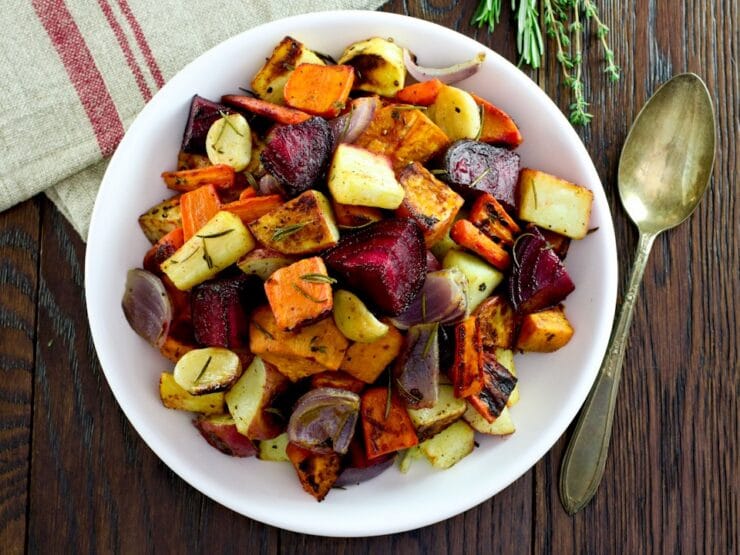Psychologist Susan Albers-Bowling notes, “It’s clear that food plays a role in mental health in general, and we know that the gut microbiome is incredibly important for how mood is regulated.” In addition to a balanced diet (with very few processed foods), increasing your intake of fiber, omega-3 fatty acids, Vitamin D, herbal teas, cinnamon, root vegetables, pumpkin seeds, and fermented foods may help combat depression and improve overall mood.
Recipe
Ingredients
- 1 lb sweet potatoes – 2 small or one large, peeled
- 3/4 lb red potatoes scrubbed clean, peel on
- 1/2 lb beets (red or golden), trimmed and scrubbed clean
- 1/2 lb large carrots peeled and halved lengthwise
- 1 parsnip medium sized (4-5 oz), peeled and halved lengthwise
- 1/2 red onion peeled
- 6 whole garlic cloves large sized
- 1/4 cup extra virgin olive oil divided
- 2 tbsp fresh thyme leaves (or 2 tsp dried thyme)
- 5 sprigs fresh rosemary (or 3 tsp dried rosemary)
- 1 tsp ground cumin
- 1 tsp kosher salt or more to taste
- 1/4 tsp black pepper or more to taste
Instructions
- Place a rack in the bottom of your oven and preheat oven to 400°F. Slice all vegetables into chunks roughly 1 1/2 inches wide.
- Place cut vegetables into a large mixing bowl. Add 3 tbsp olive oil, fresh thyme leaves, ground cumin, kosher salt, and black pepper. Stir until all vegetables are evenly coated with oil, spice and herbs.
- Brush a large rimmed baking sheet with remaining 1 tbsp olive oil. Spread the vegetables out evenly on the baking sheet. Place the rosemary sprigs on top of the vegetables, evenly spaced across the sheet.
- Roast the vegetables in the oven for 15 minutes.
- Stir the vegetables, bringing the chunks from the outside towards the center and the chunks in the center out towards the edges. Return baking sheet to oven and continue to roast until the largest chunks are tender and the edges are starting to turn golden/dark, another 15-25 minutes.
- Remove the roasted rosemary sprigs and stir the vegetables (some leaves of rosemary will remain, this is good). Season with additional salt and pepper to taste, if desired. Vegetables can be served warm or at room temperature.











